Guardians of the Galaxy part 5
What are the stakes for Peter now? He’s not out of the game yet — he’s been arrested, but, as we’ll find out soon enough, he still has the orb. He and his pursuers have all been arrested and sent to the Kyln, a high-security space prison, seemingly the Riker’s Island of the galaxy. Rocket even makes a note of how this is not a Nova-Corps-run establishment, this is something else, maybe more like Angola, or Devil’s Island, the kind of prison for lost causes, where you’re sent to die. Apparently Xandar has no concept of a trial; if you get caught horsing around on their planet you get shipped off to the worst prison in the galaxy, no questions asked. So Peter’s situation hasn’t improved, and even though his direction has changed, he still isn’t quite to the end of his first act.
“Ain’t no thing like me ‘cept me,” says Rocket when Peter refers to him as “a talking raccoon.” His defiant statement of individualism, of course, applies to all the protagonists of Guardians. Peter is a homeless half-human, Gamora is a genetically-modified adopted freak, Rocket is similarly altered, and Groot doesn’t seem to have any equal or kin in this galaxy. They aren’t just misfits, they’re all completely unique, and without friends, mates or family. The Nova Corps have uniforms, families and affiliations, they belong somewhere. Even Ronan, a rogue and outcast, still has a people, and a team. Even space-pirate Yondu has a team, even though it’s what Vonnegut called a “granfalloon,” an artificial family made up of otherwise unrelated individuals. Peter has now been cast out of Yondu’s granfalloon, which is why Yondu, the narrative wrinkle that most people identify as “too much to deal with,” is so important to the narrative. It’s one thing for Peter to have been abducted by alien space-pirates, he’s now been cast out of his adopted family. The guardians are all orphans. “Ain’t no thing like me ‘cept me” says Rocket, but Groot distills it even further: “I am Groot.” His statement of individuality is his entire vocabulary; it’s all he knows.
As the prisoners are processed, Gamora lets Peter (and us) know that she’s not “working with Ronan,” but that she was actually getting the orb to sell to “a third party.” At this point we don’t know if that party is the same person the Broker was going to sell it to or somebody else.
Peter overhears a guard listening to his personal Walkman. He gladly takes a bolt from a shock-stick to protest the guard’s abuse of his personal affects. As he writhes in pain, he recites the details of the song playing. This tape, we know now, is Peter’s religion, the only thing that means anything to him, his compass, his North Star, his comfort in an uncaring galaxy. (Also in this scene, Rocket takes note of an arm-pad that the guards use to get from one section of the prison to another, which will become important in a moment.) Peter and the others are admitted into the general population, and we see that the prisoners are largely on their own in this establishment. Gamora, whom everyone knows as one of Ronan’s goons, is marked for death.
One of the problems of a gang-of-misfits movie is establishing a good reason why the principals must be together. Usually, they are rounded up by a central leader (Seven Samurai, Ocean’s 11, The Avengers) or they’re all after the same thing (It’s a Mad Mad Mad Mad World, The Maltese Falcon, Indiana Jones and the Kingdom of the Crystal Skull). It’s much tougher, and more unusual, to have characters with conflicting agendas that stick together because their agendas, while competing, are linked. Here, Peter has no attachment whatsoever to the orb, he just wants his money. Gamora wants the orb, but not for herself. Rocket and Groot, meanwhile, want Peter. So while Peter and Gamora want the orb (for different reasons), Rocket and Groot are attached to Peter (even though they’re in prison) because they want the 40,000 units from Yondu (whom they don’t know from Adam Warlock). Peter, in the meantime, doesn’t want to be turned in for a bounty necessarily, but needs Rocket and Groot to stay alive in this prison.
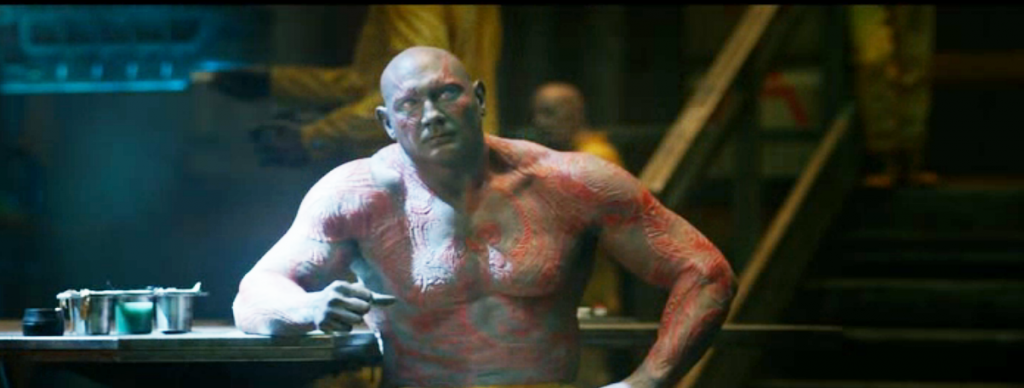 Which brings us to Drax. What does Drax want? Drax wants revenge on Ronan, who killed his family at some point in the past. His revenge-based goal ties him to Ronan thematically. In the narrative scheme of Guardians, who has a nobler purpose? Drax may be a killer, but Peter, Rocket and Groot just want money, the most common ambition of all. Ronan wants to destroy a whole planet, but he doesn’t even intend to do that himself, he plans to get Thanos to do that. (Director James Gunn mentioned recently his reluctance to put Thanos into the narrative at all, and you can see the seams where he was inserted. The idea of a bad-guy plot that involves standing by and watching as a third party does the thing the bad guy wants to do makes for a weak bad guy; the plot would be a lot cleaner if Ronan wanted the orb for himself in order to destroy Xandar himself, which is what he ends up doing anyway.)
Which brings us to Drax. What does Drax want? Drax wants revenge on Ronan, who killed his family at some point in the past. His revenge-based goal ties him to Ronan thematically. In the narrative scheme of Guardians, who has a nobler purpose? Drax may be a killer, but Peter, Rocket and Groot just want money, the most common ambition of all. Ronan wants to destroy a whole planet, but he doesn’t even intend to do that himself, he plans to get Thanos to do that. (Director James Gunn mentioned recently his reluctance to put Thanos into the narrative at all, and you can see the seams where he was inserted. The idea of a bad-guy plot that involves standing by and watching as a third party does the thing the bad guy wants to do makes for a weak bad guy; the plot would be a lot cleaner if Ronan wanted the orb for himself in order to destroy Xandar himself, which is what he ends up doing anyway.)
A gang of alien prisoners try to kill Gamora and Drax steps in, demanding to kill her himself. Then Peter steps in to help out as well, even though Gamora intends to at least steal his orb and at worst kill him to do so. He convinces Drax that if he spares Gamora’s life, he’ll be closer to his goal of killing Ronan, which, even though it’s murder, seems to be perfectly okay with everyone.
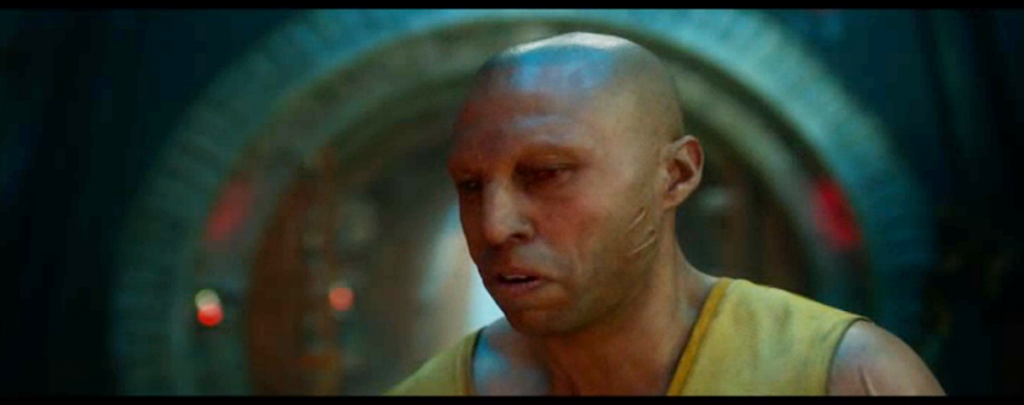 Drax’s introductory scene also includes my favorite joke in the movie. After Drax decides to spare Gamora’s life, he announces that he’s keeping an alien prisoner’s knife. We then cut to said alien, who pouts “That was my favorite knife.” It’s essentially the same joke as “I’m Not in Love,” presenting the tough-exterior/soft-interior theme in a new and refreshing way. The alien prisoner looks absolutely crushed that he’s lost his favorite knife, it’s like that knife was his Awesome Mix Vol 1. That a movie as rushed as Guardians stops for a moment to consider the feelings of an alien thug for his favorite knife is an indicator of Guardians’s essential humanity; everyone has a story, everyone feels loss, even for, especially for, the dumbest of things. It’s the dumb things, Guardians suggests, that we love the most.
Drax’s introductory scene also includes my favorite joke in the movie. After Drax decides to spare Gamora’s life, he announces that he’s keeping an alien prisoner’s knife. We then cut to said alien, who pouts “That was my favorite knife.” It’s essentially the same joke as “I’m Not in Love,” presenting the tough-exterior/soft-interior theme in a new and refreshing way. The alien prisoner looks absolutely crushed that he’s lost his favorite knife, it’s like that knife was his Awesome Mix Vol 1. That a movie as rushed as Guardians stops for a moment to consider the feelings of an alien thug for his favorite knife is an indicator of Guardians’s essential humanity; everyone has a story, everyone feels loss, even for, especially for, the dumbest of things. It’s the dumb things, Guardians suggests, that we love the most.
Why does Peter save Gamora from Drax’s wrath? He says it’s because she knows where to sell his orb, which makes Gamora now a replacement Broker for Peter. Gamora has gone from dutiful-daughter-of-Thanos to dutiful-henchman-of-Ronin to self-employed thief to unwilling-accomplice-of-Peter, a highly frustrating path for a woman who obviously wants to be free to write her own ticket.
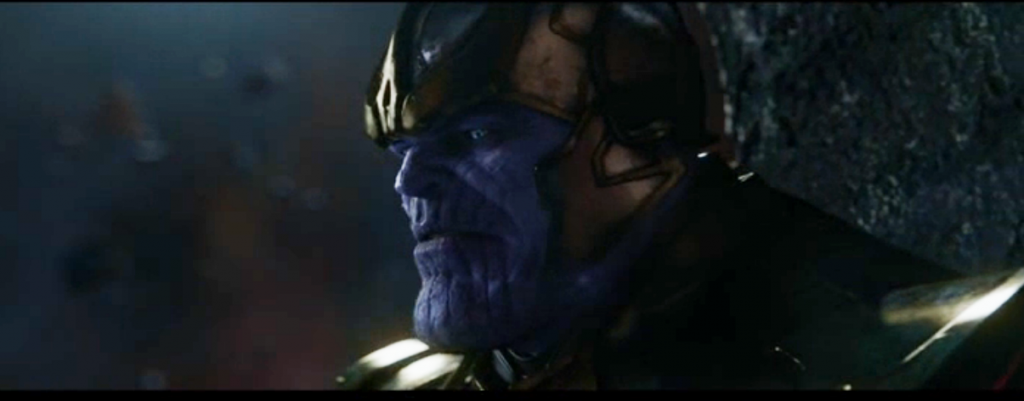 Meanwhile, Ronan is summoned to meet with Thanos, who is not pleased with the way the orb situation has played out. He (justifiably) bawls Ronan out for acting like such a petulant child. For someone who desperately wants to be taken seriously, things have gotten worse and worse for Ronan. No one has taken him seriously since the Nova Corpsman whose head he smashed in his introductory scene. Even here, Nebula, his ostensible sidekick, fiddles with her cybernetic implants rather than pay attention to the conversation between her boss and her father. (She seems annoyed, but not surprised, when Thanos refers to Gamora as his favorite daugther.) “Return to me again empty-handed, and I will bathe the starways in your blood,” threatens Thanos, to a man who knows something about bathing in people’s blood. When the conversation ends, Nebula is openly hostile to the man she’s supposed to be serving, and takes charge of the next step of their plan, which is to get to the Kyln and get the orb.
Meanwhile, Ronan is summoned to meet with Thanos, who is not pleased with the way the orb situation has played out. He (justifiably) bawls Ronan out for acting like such a petulant child. For someone who desperately wants to be taken seriously, things have gotten worse and worse for Ronan. No one has taken him seriously since the Nova Corpsman whose head he smashed in his introductory scene. Even here, Nebula, his ostensible sidekick, fiddles with her cybernetic implants rather than pay attention to the conversation between her boss and her father. (She seems annoyed, but not surprised, when Thanos refers to Gamora as his favorite daugther.) “Return to me again empty-handed, and I will bathe the starways in your blood,” threatens Thanos, to a man who knows something about bathing in people’s blood. When the conversation ends, Nebula is openly hostile to the man she’s supposed to be serving, and takes charge of the next step of their plan, which is to get to the Kyln and get the orb.
(Although I’m still not sure why Thanos needs Ronan at all. Assuming that he has too much fun floating on his floaty chair to go and get an orb for himself, why not send Gamora and Nebula by themselves to begin with? Why involve Ronan, whom he despises, at all?)
What are the stakes now for Ronan? If he had been hoping to call on Thanos for a favor in exchange for the orb, that hope is now gone. Thanos even says straight out “Your politics bore me,” he doesn’t give a fig about Ronan’s beef with Xandar. So now Ronan finds himself the opposite of a tyrant, he is, rather, now a slave, doomed to get Thanos what he wants and get nothing in return. This is actually Ronan’s Act II Low Point, the part where he needs to turn things around pronto if he’s going to stand a chance of a happy ending.
Our movie that opened with a Raiders-style heist sequence and then moved to a cartoonish brawl in a metropolitan park now climaxes its first act with a prison-break sequence. Like those other two set-pieces, the prison break is improvised, thrown together, gag-heavy and heavily reliant on character. We see Groot’s innocence (he starts the break because he wasn’t paying attention), but then we see his Hulkishness as he withstands huge amounts of punishment and metes out destruction. Just as most of the characters in Guardians have tough exteriors and soft interiors, Groot has a soft exterior but a tough interior: get him riled and he’s well-nigh indestructible. We see Drax, Rocket and Gamora cut loose, glowing as they exercise their fighting skills, and then, because this is Guardians, we cut in the middle of all the action to show Peter trying to convince a prisoner to give up his prosthetic leg. So the sequence goes: awesome Groot, awesome Drax, awesome Gamora, lame Peter. Or, to put it more abstractly, kick-ass, kick-ass, kick-ass, kick-ass, kick-ass, joke.
Our team assembled, they enter the prison watchtower and escape against impossible odds with the aid of a sudden lack of gravity (much as the movie itself succeeds with its sudden lack of gravity, the opposite of the angsty, gritty superhero movies that have preceded it). As they escape, Peter has to make a side-trip to get his Walkman. For the moment it takes for him to get it, it seems that his Awesome Mix is actually more valuable to him than the movie’s Maguffin. Like the alien’s knife, Peter’s dumbest thing is his favorite and holds the key to his soul. He even uses the orb as a weapon to clonk on the head of the guard with his Walkman; the orb is a mere tool at this point, for Peter to get what he truly wants. (It seems odd to me that the orb, not to mention Peter’s firearms, would be lobbed into a box in the storage room; it would seem to me that anything considered contraband – the orb is, after all, stolen – would have been confiscated. But the particulars of the Nova Corps penal system greatly elude me.)
Act I ends as Peter catches up to his now-friends, orb (and Walkman) in hand. To underscore the Walkman’s dumbness (and our love for it), Drax sees what Peter has made such a fuss about and remarks “You’re an imbecile.” And yet, aren’t we all, when our soul is at stake.
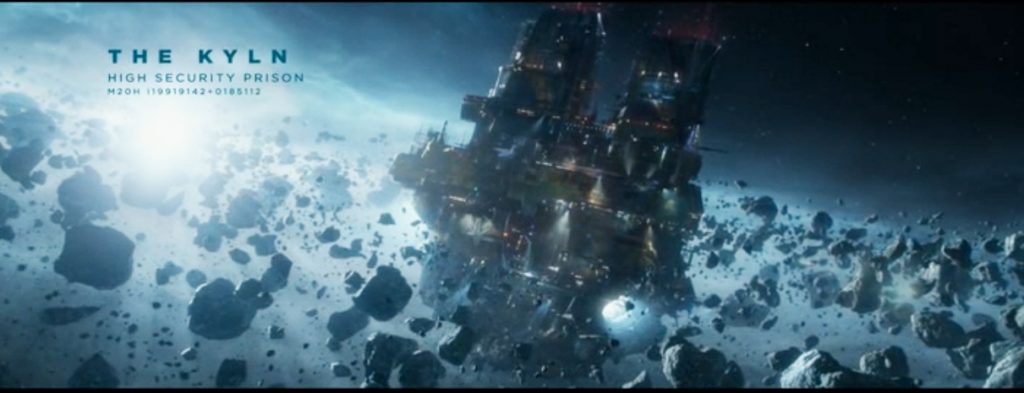
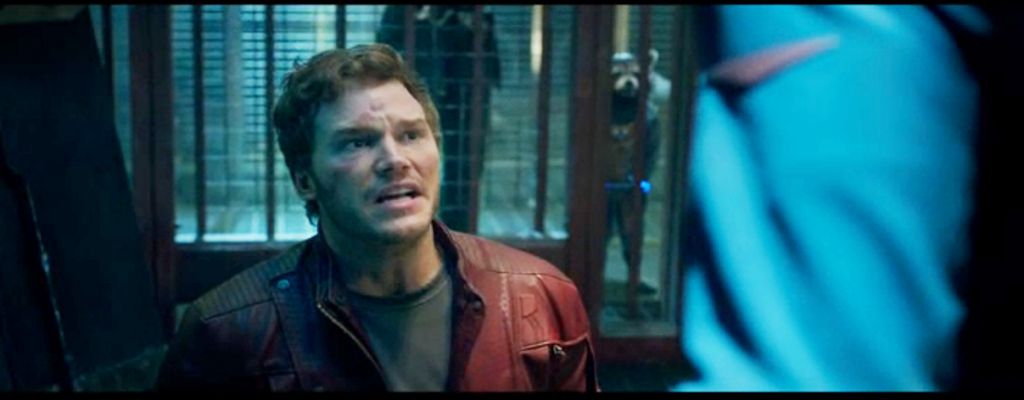
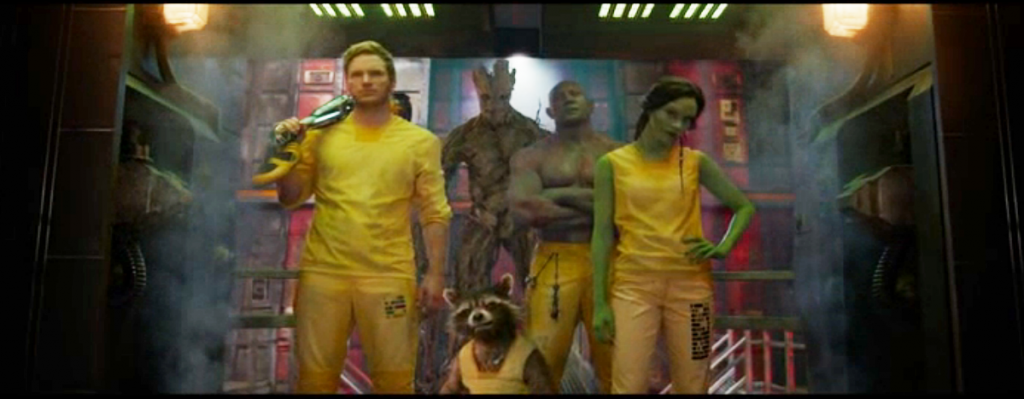
I kind of like the escalation in stakes as Ronan casually takes out The Other, who had been terrorizing Loki throughout Avengers.
I didn’t get the sense that Peter had been cast out of his family. Yondu seems determined to make sure he stays in the family, even after Peter betrayed. (And despite his threats of letting the other members of the family eat him.)
The Nova Corps’ reaction to Groot “What the hell is that thing” plays oddly for a clearly multi-species society, but it does help set up Groot as being very exotic, if not unique. It’s kind of a pity Peter didn’t have an issue of Ranger Rick laying around for Rocket. (Did they still have that in 1988?)
Incidentally, one thing I’ve noticed in my repeated listenings of the soundtrack: There’s a distinct reference to tear stains in “I’m Not in Love” (I think), which casts an interesting light on the stains Peter mentions mentions on his ship later. Maybe he’s being more or less literal, or maybe he’s hiding something with that adolescent gross-out bravado.
It’s unclear to me what Yondu intends to do with Peter once he finds him. He’s clearly angry with him, but if Peter feels that Yondu is giving him tough love, then why not just take the orb to Yondu once he gets out of the Kyln? Or take it to him straight away and not go straight to the Broker?
I got the vague impression Peter and Yondu just go through this sort of thing every once in a while (not the epic consequences), more or less just to keep things fresh.
I was watching the Cinema Sins take on this movie, and there’s a lot of complaining that Peter left at an early age, and couldn’t have gotten the replacement supplies for his Walkman, or built his tape deck. But after repeated viewings, I wonder if there’s any reason he couldn’t have gone back to Earth. I don’t think there’s was much motivation for him to go back to stay once he’d grown up in outer space and his mom was gone. (there, at least I reflected on what the protagonist wants.) Further, I think Peter’s audio equipment (including the tape) could have been manufactured or replaced by high-tech artisans to just look like 20th century tech.
I have no patience for Cinema Sins. There are many, many fine folks on the internet who love movies and also love to pick them apart (HISHE, namely), but Cinema Sins is just carping and being jerks. A pox on them.
The Alien in the Kyln is called Moloka Dar. He is the one that loses his favourite knife. He’s played by actor Alexis Rodney. 😉
And well-played he is, sir!
In the prison break, I figured that Rocket sends Peter (who is worth 40k somethings) to get the leg because: a) it’s funny, b) it’s safe. If Rocket had actually asked him to do something dangerous, and Peer got killed, he would be out Peter’s bounty.